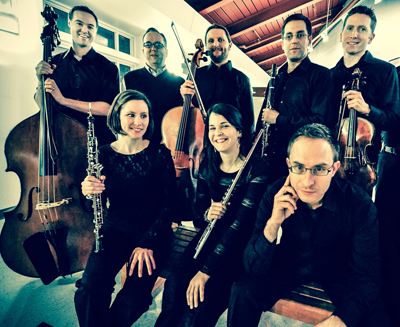Lovely rarities served up with feeling by Inscape Chamber Orchestra

Inscape Chamber Orchestra performed in Bethesda Saturday night.
Since its founding in 2004, Inscape Chamber Orchestra has brought together some of the area’s most accomplished and intrepid musicians. Under the leadership of artistic director Richard Scerbo, they regularly present and record new music and underperformed works of the 20th century.
On Saturday night they performed just such a program to a small audience at their one-time home base, the Episcopal Church of the Redeemer in Bethesda.
The evening opened with Samuel Barber’s Capricorn Concerto, composed in 1944 using the same instrumentation as Bach’s Brandenburg Concerto No. 2. Barber imitated the busy, rhythmic style of his model in the first movement, with dance-like fast sections in a pleasing groove. Flutist Susanna Loewy, oboist Bethany Slater, and trumpeter Brandon Almagro, standing at the back of the ensemble, skillfully traded contrapuntal entries woven into one another.
In the soft second movement, Barber experimented with unusual combinations, like muted trumpet and oboe over pizzicato violas, ending with lush strings con sordini complemented by an elegiac oboe solo. The third movement rocketed with heraldic string strikes and fanfare-like trumpet solos, often pulsating with ostinato figures. Scerbo’s assured conducting kept the ensemble tight and on track, albeit with some intonation issues in the violins.
The Barber paired beautifully with a youthful work by Benjamin Britten. His Op. 1, the Sinfonietta, was completed in 1933 while the composer was a student at the Royal College of Music. Inscape played Britten’s original version for five strings and four woodwinds plus horn, but with two players on the string parts. The first movement bubbled with energy and confidence, echoing the baroque verve heard in the Barber.
The slow movement, a set of plangent variations, stood out for its melodic interest and lush harmony, especially in an intense passage for two solo violins. After a booming crescendo climax, the wind instruments traded pastoral solos over plush string chords. Rhythmic percolation again enlivened the third movement, in running scalar patterns and Morse code-like repetitions that whirled and teetered in increasingly crazed, overlapping entrances. Scerbo’s careful cuing and steady leadership kept the group on track.
Gerald Finzi’s Clarinet Concerto was the most recent work on the program, completed in 1949 for string orchestra. Clarinetist Evan Ross Solomon, who also serves as Inscape’s executive director, gave the solo part a polished sheen in the first movement, meditative and brooding in style. Intonation problems again crept into the violins here and there, generally toward the top of their range.
No such problems in the gorgeous slow movement, as the strings glowed in muted harmonies reminiscent at times of Barber’s celebrated Adagio for Strings from a decade earlier. Solomon soared on the solo part with consummate breath control and sureness of intonation, keening against the poignant strings. The ensemble struck just the right happy-go-lucky tone in the jovial rondo theme of the last movement, in alternation with strident episodes.
This was Inscape’s final concert on the concert series of the Episcopal Church of the Redeemer, where they have played regularly since 2006. Due to a change of music leadership, the once-free concerts now require paid tickets. Happily, Inscape continues to expand its range of venues beyond Bethesda, including a new partnership with the BlackRock Center for the Arts in Germantown and appearances at UMBC’s Linehan Concert Hall. This is excellent news for listeners who like to hear music off the beaten path.
The Barber and Finzi works will be repeated 4 p.m. May 4 at Christ Church Episcopal, Georgetown, along with soprano Katelyn Aungst in Osvaldo Golijov’s Tenebrae. Admission is free. inscape.org



